Hello, bunny lovers! Whether you’re an experienced rabbit owner or just beginning your journey with these charming creatures, there’s always a new layer of understanding to uncover. One of the most rewarding aspects of sharing your life with a rabbit is building a trust-filled relationship, and that’s exactly what we’re focusing on today.
Bonding with a rabbit involves understanding their body language, respecting their space, providing a healthy diet, maintaining a routine, and showing kindness.
Creating a bond of trust with your rabbit is a delightful journey requiring patience, consistency, and a sprinkle of creativity. But don’t worry, we’ll be with you every step of the way, providing guidance and support.
Forming a relationship with your rabbit shouldn’t be a one-way street. It’s a two-way bond, solidified through mutual understanding and respect.
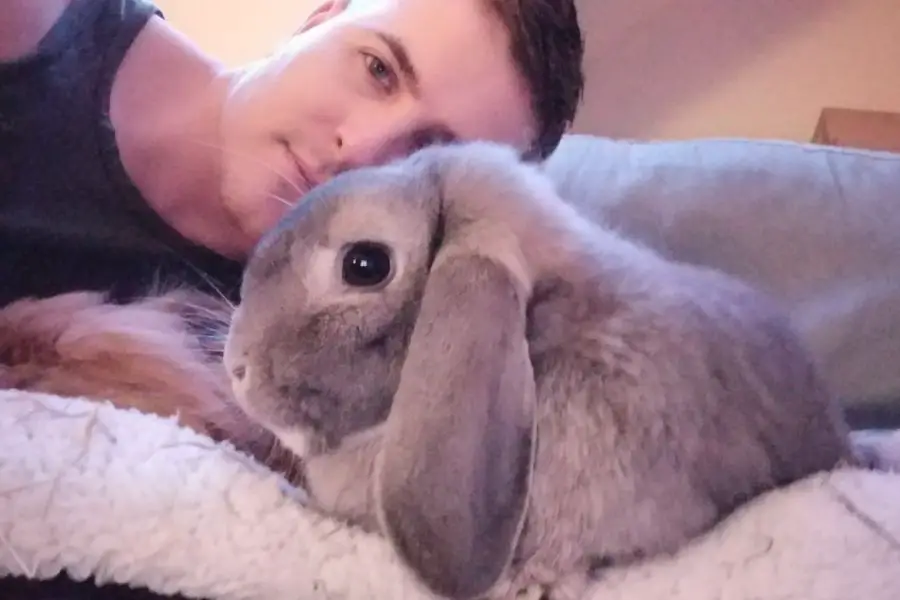
Each rabbit has its own unique personality, and learning to appreciate this individuality can significantly strengthen your relationship.
By nature, rabbits are prey animals and are often naturally cautious, even skittish. Hence, building trust with them involves creating a secure and comfortable environment where they can let their defenses down and reveal their adorably endearing selves.
In this guide, we’re going to delve into the top 15 steps to build trust with your rabbit. These steps are arranged by their importance, covering a wide range of topics, from interpreting your rabbit’s body language to respecting their boundaries, and even including some fun elements like training your rabbit and providing them with toys.
So, gear up to boost your rabbit care skills, and create a bond that is stronger than a rabbit’s love for carrots. Let’s embark on this rewarding journey together and discover the joy of earning your rabbit’s trust. Onwards, to a bunny-filled adventure!
The Trust Factor: Key to a Happy Rabbit Relationship
If you’re dreaming of a harmonious, joyful relationship with your rabbit, trust is the key. It’s the magic potion that turns a wary, alert bunny into a relaxed, friendly companion. Understanding why trust is so crucial is the first step in the right direction.
In their natural habitat, rabbits are prey animals, always on high alert for threats. When they join our household, they bring these instincts with them.
They might initially view us, humans, as predators, which is why establishing trust is vital, It reassures them that we’re not a threat, but a source of safety, affection, and of course, tasty treats!
Trust Transforms Interactions
When your rabbit trusts you, it changes everything. A trusting bunny is more likely to approach you, engage in play, and let you pet them.
Besides making your interactions more enjoyable, trust also simplifies essential tasks like grooming and health checks. These become significantly less stressful when your rabbit doesn’t perceive you as a threat.
The Road to Trust
Building trust is not an instant process, though. It demands patience, consistency, and understanding. As you spend quality time with your rabbit and follow the steps in this guide, you’ll see the bond of trust grow.
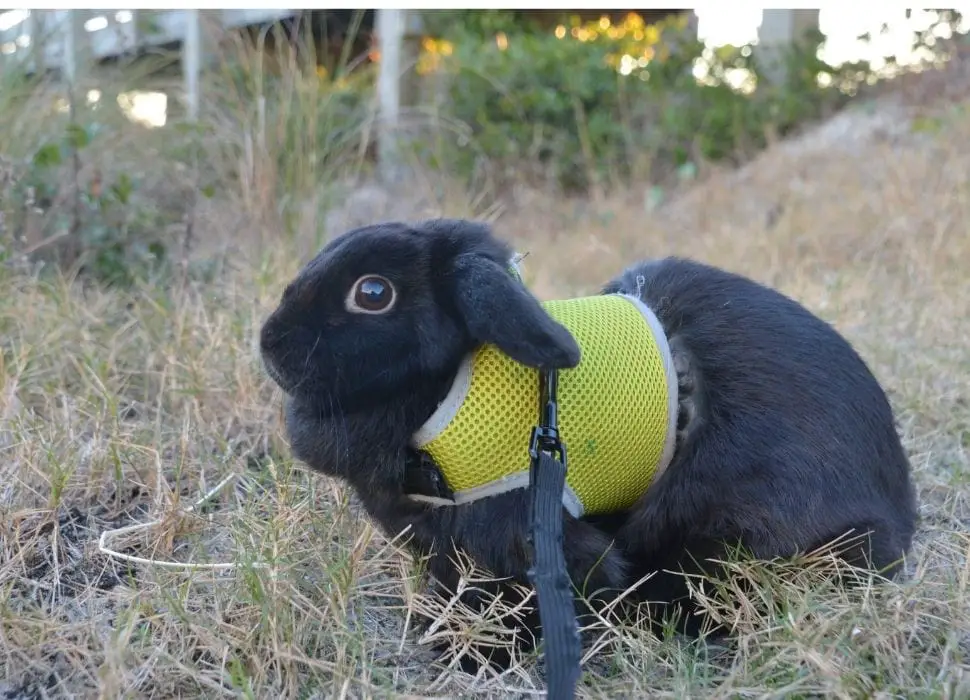
That’s where the real joy of rabbit companionship comes in – seeing your rabbit’s unique personality unfold as they become comfortable and secure in your presence.
Looking Ahead
In the upcoming section, we’ll get into the nitty-gritty details of how to cultivate this trust. Remember, each rabbit is a unique individual.
What works for one might not work for another. It’s all about understanding your rabbit and finding a strategy that suits both of you. So, are you ready to embark on this exciting journey of rabbit bonding? Let’s hop right into it!
Understanding Rabbit Communication
Rabbits have a unique language of their own. They communicate primarily through body language, which is an intricate blend of postures, movements, and behaviors. Each twitch of a nose, each flick of an ear holds meaning. Understanding rabbit communication is vital if you want to build a deep, trusting relationship with your bunny.
Learning the Body Language
Much like humans, rabbits express their feelings through body language. When a rabbit is happy, it might leap into the air and twist its body – this is called a “binky”. If it’s feeling threatened or scared, it might thump its hind legs. Observing and interpreting these cues accurately can dramatically improve your relationship with your rabbit.
The Significance of Sounds
Rabbits aren’t the most vocal animals, but they do make sounds to convey their feelings. A content bunny might purr when petted, while a distressed one might growl or whimper. Listening carefully to these sounds will help you understand your rabbit’s needs and emotions better.

Mimicking Rabbit Behavior
Once you’ve got a grasp of rabbit language, you can use it to communicate back to them. By mimicking certain rabbit behaviors, you can convey your own messages of trust and friendliness. This interaction helps create a stronger bond between you and your bunny.
Remember, understanding your rabbit’s communication is the foundation of good rabbit care. It allows you to respond appropriately to their needs, making them feel safe and loved, and that is the key to a harmonious rabbit-human relationship.
The Importance of Rabbit Companionship
Think about the last time you felt lonely. Not the best feeling, right? Well, rabbits are just like us in that sense.
They crave companionship and social interaction. In the wild, rabbits live in groups called warrens, and these social structures are critical to their well-being. They eat, play, and even groom each other. It’s a veritable bunny society!
Bunnies Need Bunny Friends…
Having another bunny friend can provide a level of companionship that even the most loving and attentive human can’t replicate.
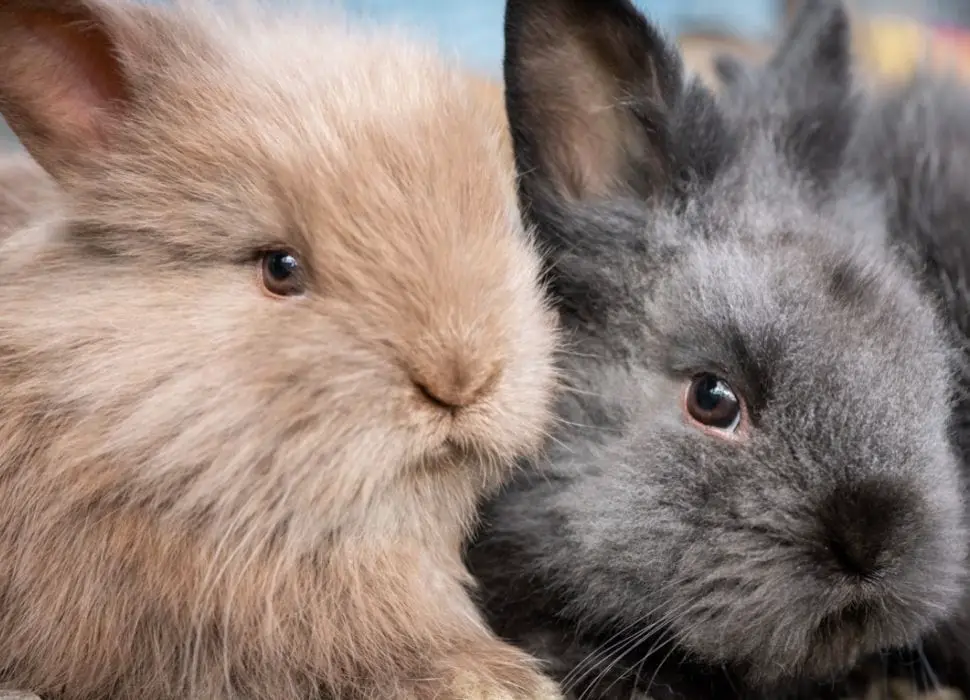
Rabbit-to-rabbit interactions involve unique behaviors like mutual grooming, which is a fundamental aspect of their social bonding. So, if you have just one rabbit, you might want to consider adding another one to your family. But remember, introductions should be done carefully to ensure a smooth transition.
…And Human Friends Too
But let’s not underestimate the value of human companionship in a rabbit’s life. As their caregiver, your interactions with your rabbit go beyond providing food and cleaning their living area. You’re a companion, a playmate, and a source of comfort.
The time you spend together, whether it’s during playtime, training, or quiet bonding moments, contributes significantly to your rabbit’s overall happiness.
Building Trust
Building a relationship of trust with your rabbit is a rewarding process. It involves understanding their body language, respecting their boundaries, and creating a safe, comforting environment for them. The more secure your rabbit feels with you, the more it will open up and show its unique personality.
Remember, your rabbit depends on you for more than just their physical needs. They rely on you for social interaction and emotional support.
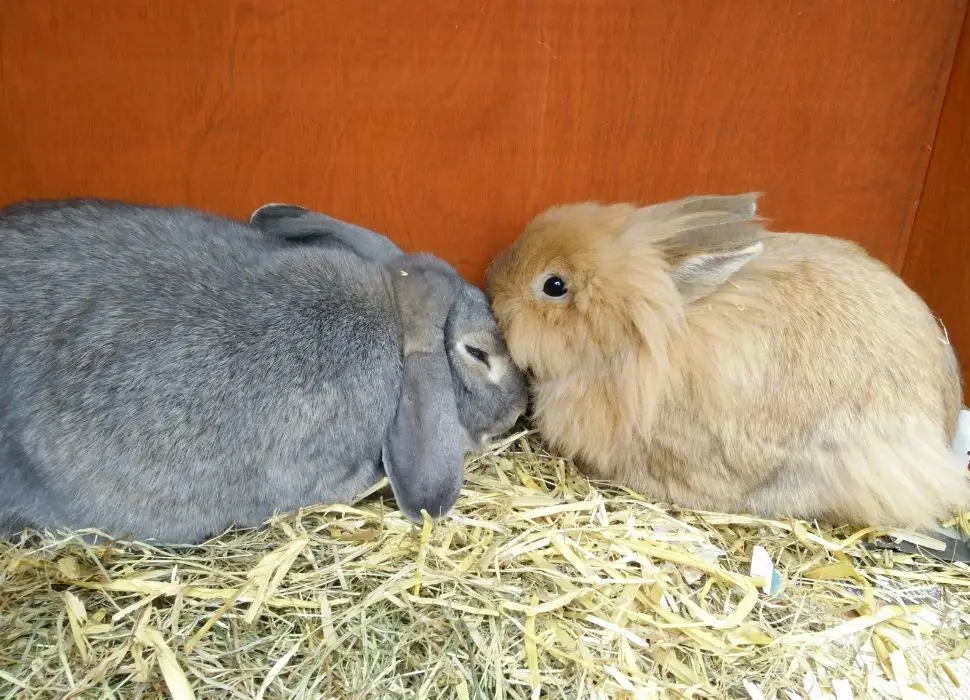
Providing this level of companionship is a responsibility, but it’s also one of the most fulfilling aspects of being a rabbit owner. Your bond with your rabbit will continually grow, deepening the understanding and love between you both.
The Individuality of Rabbits
Just like humans, each rabbit has its own distinct personality. Some are outgoing and playful, while others are more reserved and prefer quiet time. Understanding this individuality is key to forming a deep and meaningful bond with your rabbit.
Recognizing Rabbit Personalities
Recognizing a rabbit’s personality traits requires patience, observation, and time. You might notice certain patterns in their behavior, such as a preference for certain toys or a particular fondness for morning play sessions. These small details are insightful glimpses into your rabbit’s individual character.
Customizing Care
Once you understand your rabbit’s unique personality, you can tailor your care approach to match their needs and preferences.
A more energetic rabbit might need additional playtime, while a shy rabbit might appreciate more hiding spots in their habitat. Customizing your care approach can significantly improve your rabbit’s quality of life.
Respect Their Boundaries
Respecting your rabbit’s boundaries is another essential aspect of acknowledging their individuality. If your rabbit doesn’t like being picked up or touched in certain ways, it’s crucial to respect that.
Creating a relationship based on trust and respect will make your rabbit feel safe and loved.
Adapt and Learn
Finally, it’s important to remember that a rabbit’s behavior may change over time. They may develop new preferences or exhibit new behaviors as they grow and age.
Staying adaptable and willing to learn is a key part of being a responsible and loving rabbit caretaker.
In the end, appreciating your rabbit’s individuality is not just about understanding their unique behaviors and preferences.
It’s about celebrating them as the distinct, charming individuals they are and providing the best possible care tailored to their unique needs.
The Role of Play and Stimulation
Rabbits are energetic and inquisitive creatures, and playtime is a crucial part of their day. It helps keep their minds sharp and their bodies fit.
Whether it’s chasing a ball, jumping over obstacles, or exploring a new toy, each play session offers your rabbit a chance to engage with its environment in exciting ways.
Bunny-Approved Toys
Toys are not just for fun; they also stimulate your rabbit’s natural instincts like digging, chewing, and foraging.
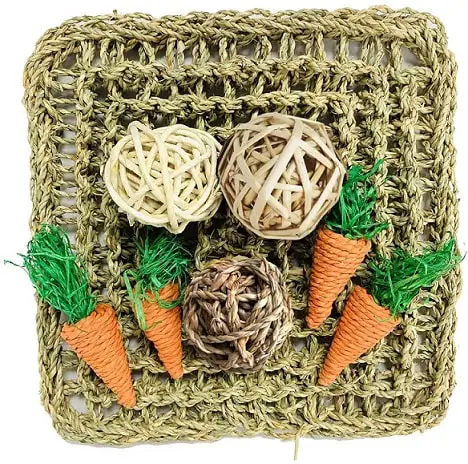
Providing a variety of toys can keep your rabbit entertained for hours, helping to prevent boredom and related behavioral problems.

From simple DIY toys like toilet paper rolls stuffed with hay to store-bought puzzle toys, there’s a world of playthings to discover. For more ideas on toys and enrichment, you can read our post here.
A Space to Explore
In addition to toys, rabbits need room to hop around freely. Giving your rabbit space is not just about having a large cage or pen.
It’s about providing a safe, enriching environment where they can explore, hide, and engage in typical rabbit behaviors.
Integrating elements like tunnels, hiding spots, and platforms can turn your rabbit’s living space into an exciting bunny playground.

Learning Through Play
Training your rabbit can also be a form of play. Teaching them tricks like coming when called, spinning in a circle, or jumping through a hoop can stimulate their minds and deepen your bond.
It’s a fun and rewarding process for both of you, and it can further enhance your rabbit’s trust in you.
Balance is Key
Like all good things, play and stimulation should come in balance. Your rabbit also needs quiet moments for rest and relaxation.
Observing your rabbit’s cues will help you understand their unique preferences and rhythms, ensuring they have the right mix of activity and downtime.
In the end, it’s all about creating a lifestyle that respects and enriches your rabbit’s nature. By considering their need for companionship, understanding, and stimulation, you’ll be on your way to a rewarding relationship with your fluffy friend.
Remember, every rabbit is unique, and getting to know yours is a journey filled with joy, surprises, and lots of bunny love.
The Power of Kindness in Rabbit Bonding
Rabbits are intelligent and sensitive creatures that respond incredibly well to kindness. This section delves into why kindness is crucial in the bonding process and offers practical tips to show your furry friend the respect they deserve.
Respecting Your Rabbit’s Natural Behaviors
Rabbits, while endearing companions, can also exhibit behaviors that may not be ideal for a housemate. They may choose a particular rug as their bathroom, chew holes in your favorite clothes, or if unsprayed males, possibly spray walls.
It’s essential to remember that these are natural behaviors for rabbits, and they should never be punished for doing what comes naturally.
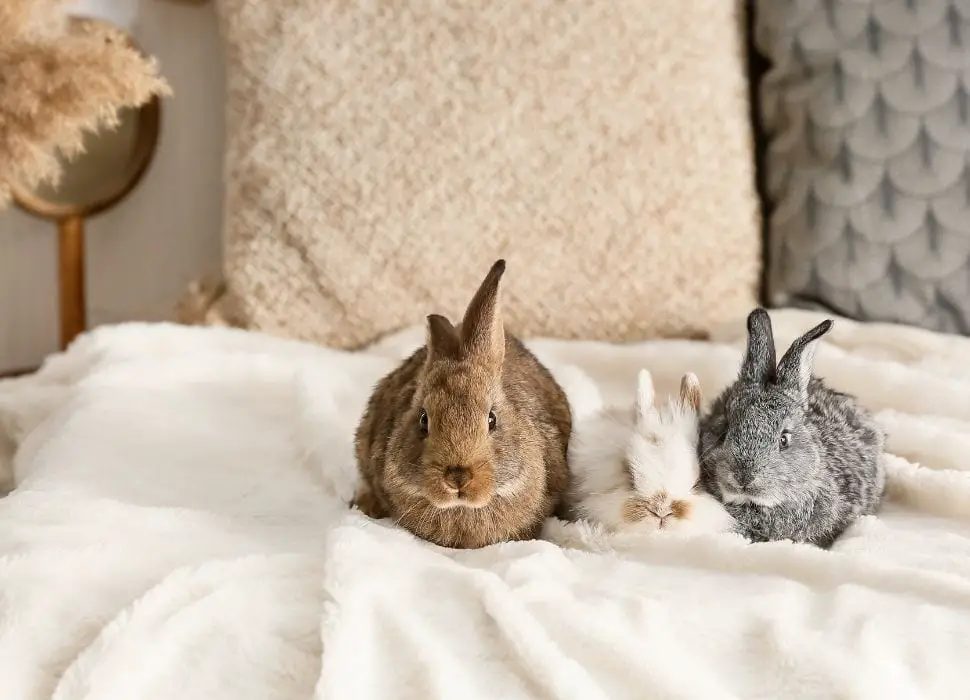
Reacting with anger or aggression can damage the trust you’ve been building. Rabbits are gentle creatures deserving of kindness.
Owning a rabbit is a privilege, and any issues should be seen as opportunities to learn and adapt.
Adjusting to Your Rabbit’s Preferences
As you continue to bond with your rabbit, it’s important to be considerate of their preferences. Rabbits, being prey animals, instinctively feel unsafe when their feet are off the ground.
While baby rabbits might seem fearless and enjoy being handled, their personality might change as they get older.
If your rabbit prefers not to be handled, respect that preference. Just like you wouldn’t appreciate being picked up without warning, neither does your rabbit. Give them their space and let them approach you on their own terms.
The Art of Handling Rabbits
Handling a rabbit requires a delicate balance of respect and gentleness. This section explains why manhandling is counterproductive to bonding and offers suggestions on how to handle your rabbit correctly.
If you absolutely feel the need to pick up your rabbit, you should do so in a way that respects their natural instincts and preferences.

A good starting point is our article on how to train a rabbit to be held. It provides comprehensive guidance on the right approach to this delicate task.
Creating a Safe, Calm Environment
To foster a strong bond with your rabbit, it’s essential to create an environment that makes them feel safe and comfortable. This section provides practical advice on how to avoid scares and make your rabbit feel at ease in your presence.
Avoiding Loud Noises
Rabbits are easily scared, and as humans, we can appear quite imposing to them. If you want your rabbit to be comfortable around you, it’s important to minimize loud noises.
Turn off the TV for a while, or any other device that could startle them, and enjoy some quiet time together.
Speaking Softly and Gently
When you’re talking to your rabbit, make sure you use a soft, gentle voice. Avoid shouting or talking loudly. If your rabbit associates your presence with being startled, it could harm your bonding process.
Creating a serene environment for your rabbit is a simple yet effective way to earn their trust and foster a deep, lasting bond. Remember, patience and understanding are key in this journey of bonding with your rabbit.
Nourishing a Bond with a Healthy Diet
Our bonding journey with a rabbit doesn’t stop at understanding their behavior or creating an environment that suits them. An integral part of this process lies in the provision of a nutritious, well-balanced diet.
A healthy rabbit is a happy rabbit, and a happy rabbit is more likely to bond with you. So let’s unpack the importance of diet in forming a bond with your bunny.
The Role of a Balanced Diet in Bonding
A good diet contributes significantly to your rabbit’s overall health and energy levels. A healthy, energetic rabbit will be more open to forming a bond with you.
They’ll come to recognize you as their primary source of nourishment, associating you with their favorite foods, which in turn fosters trust.
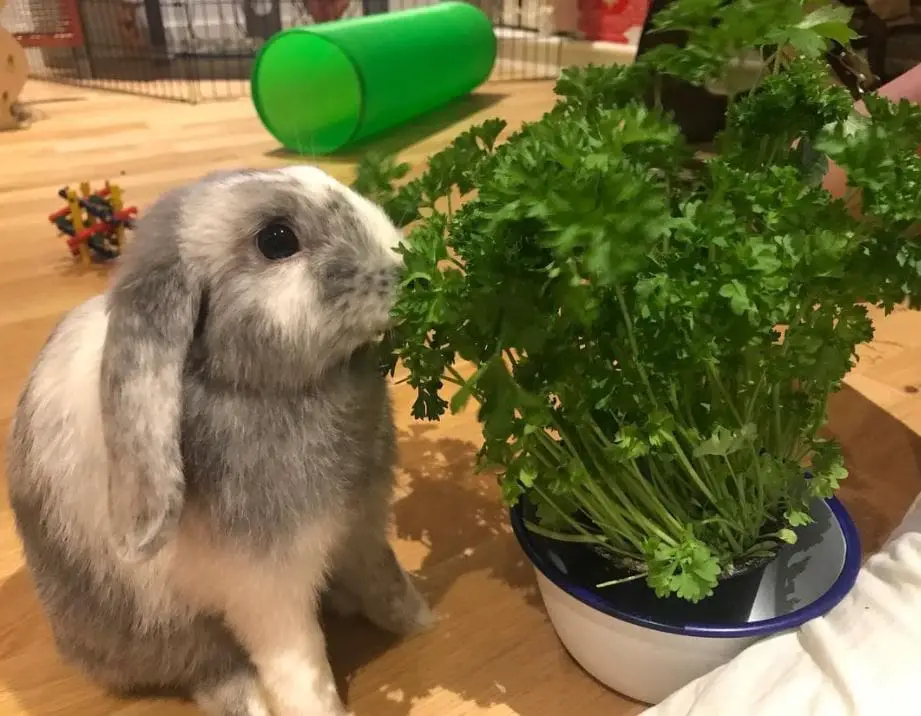
On the flip side, rabbits fed unsuitable diets, such as some pet shop mixes, may suffer health issues. They could become lethargic, showing little interest in interacting with you, let alone forming a bond.
Feeding Hay: The Rabbit’s Dietary Staple
Rabbits have relatively simple dietary requirements. Hay should form the foundation of their diet, accounting for around 80% of their intake.
Imagine a ball of hay equal to the size of your rabbit – that’s roughly how much they should consume daily.
For a complete guide on what your rabbit should be eating, you can read our post here.
Diversifying the Diet with Greens and Fruits
In addition to hay, your rabbit’s diet should include a variety of greens. Approximately two cups of vegetables per day will help keep your bunny happy and healthy.
Occasionally, you can offer a small piece of fruit as a treat. These dietary additions provide some variety and can be a source of joy and anticipation for your bunny.
Hand Feeding: Building Trust through Nutrition
One effective way to bond with your rabbit is through hand feeding. Start with irresistible veggies or let your rabbit eat pellets directly from your hand.
Over time, your rabbit will grow to associate your presence with the provision of food, a key step in establishing trust.
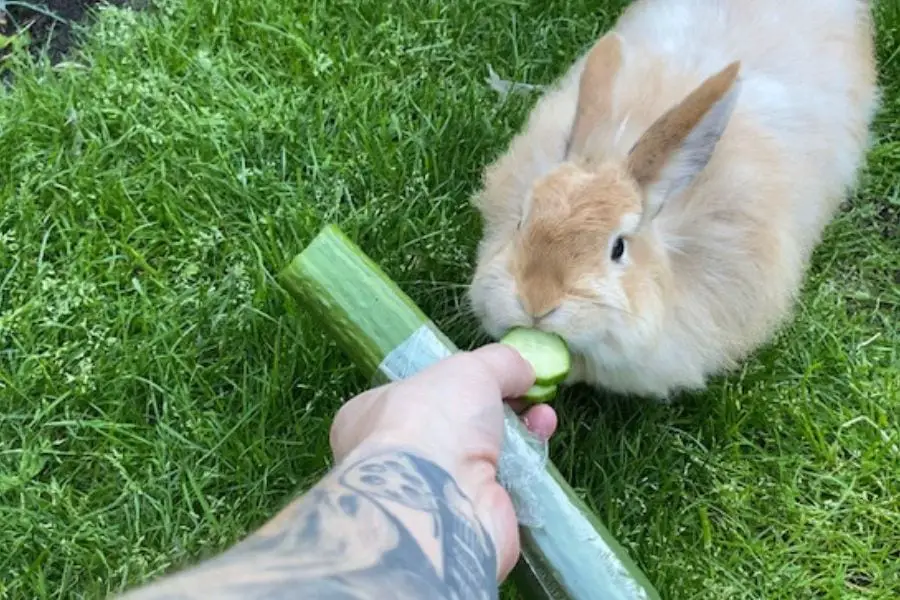
Once your rabbit is comfortable taking food from your hand, you can gradually make them work a bit harder for it. Kneel close to them on the floor and move the food closer to your chest.
Encourage your rabbit gently with a soft voice, rewarding their efforts with a piece of the food.
Food as a Tool for Recognition
By incorporating food in your interactions with your rabbit, you can help them recognize you as their caregiver. Rabbits are very perceptive, and they’ll start to recognize you by sight and sound.
Associating your presence with meal times helps them learn to recognize you and even respond to their name.
Avoiding Unhealthy Treats
While food can be a powerful bonding tool, it’s important to avoid unhealthy treats. Sugary snacks can harm your rabbit’s health.
Instead, opt for small pieces of fruit, keeping in mind that these should be given sparingly due to their naturally occurring sugars.
In conclusion, using food as a means of interaction, rather than merely serving it in a bowl or hutch, can significantly contribute to building a strong bond with your rabbit.
Remember, it’s all about consistency, patience, and understanding your bunny’s needs and preferences. Happy feeding!
Other basic needs of rabbits
Safe and Stimulating Environment
Your rabbit’s environment plays a crucial role in their well-being. They need a spacious enclosure with plenty of room to hop around and explore.
A stimulating environment with toys, hiding spots, and opportunities for exploration can keep your rabbit physically active and mentally stimulated.
Regular Exercise
Rabbits are energetic creatures that need regular exercise to stay healthy. Allow them plenty of time outside their enclosure under supervision, preferably in a rabbit-proof area.
This will give them the freedom to explore, play, and satisfy their natural curiosity.
Regular Vet Check-ups
Just like any other pet, regular veterinary check-ups are vital to ensure your rabbit’s health. An annual health check can help detect potential health issues early.
Also, remember to spay or neuter your bunny – this has significant health benefits and can prevent many behavioral issues.

Emotional Needs
Lastly, don’t forget about your rabbit’s emotional needs. They are social animals that crave companionship.
Spend quality time with your bunny every day, but also respect their need for alone time. Learn to understand their unique ways of communicating, respect their boundaries, and provide them with the emotional support they need.
By meeting these basic needs, you’ll not only ensure your rabbit’s well-being but also lay a solid foundation for a trusting, loving relationship with them. Now, isn’t that what every bunny parent dreams of?
Practical Steps for Bonding with a Rabbit
Understand Your Rabbit’s Body Language
Every twitch of the ears or thump of the foot has a meaning when it comes to rabbit communication.
Understanding these signals is crucial to forming a strong bond with your rabbit. Rabbits communicate through body posture, ear movements, and even vocal sounds. For example, if a rabbit thumps its hind leg, it’s usually a sign of fear or warning.
If its ears are back and flat against its body, it’s a sign of annoyance or fear.
Respect Your Rabbit’s Boundaries
Rabbits are prey animals, which means their instinct is to be on guard for potential threats. It’s essential to respect their space and avoid sudden movements that might scare them.
Always approach them gently, preferably at their level, and avoid picking them up unless absolutely necessary. Over time, this will help them learn that you’re not a threat, which is a significant step toward building trust.
Spend Quality Time with Your Rabbit
Building a bond with a rabbit requires time and patience. Start by spending time near their cage or enclosure, reading a book, or doing another quiet activity.
This allows your rabbit to get used to your presence without feeling threatened. Over time, they’ll become more comfortable with you and may even approach you out of curiosity.
Provide a Healthy Diet
Proper nutrition plays a vital role in your rabbit’s overall health and happiness. The majority of their diet should be hay, which is essential for their digestive health and dental care.
Supplement this with a variety of fresh vegetables, a small number of fruits, and a limited number of high-quality pellets.
Regular feeding times, combined with a balanced diet, can help your rabbit associate you with something positive – mealtime!
Stick to a Routine
Rabbits are creatures of habit and thrive on routine. Regular feeding times, consistent playtimes, and a stable environment can make your rabbit feel more secure and comfortable. Changes to their routine can cause stress, so try to keep things as consistent as possible.
Give Your Rabbit Space
Just like humans, rabbits need their own space where they can relax and feel safe. A spacious cage or enclosure is essential, but they also need time outside their cage each day to exercise and explore. Providing a safe, rabbit-proofed space for them to roam can greatly enhance their quality of life.
Play with Your Rabbit
Interactive play is a fantastic way to bond with your rabbit. It’s also an excellent opportunity to stimulate their mind and cater to their natural behaviors.
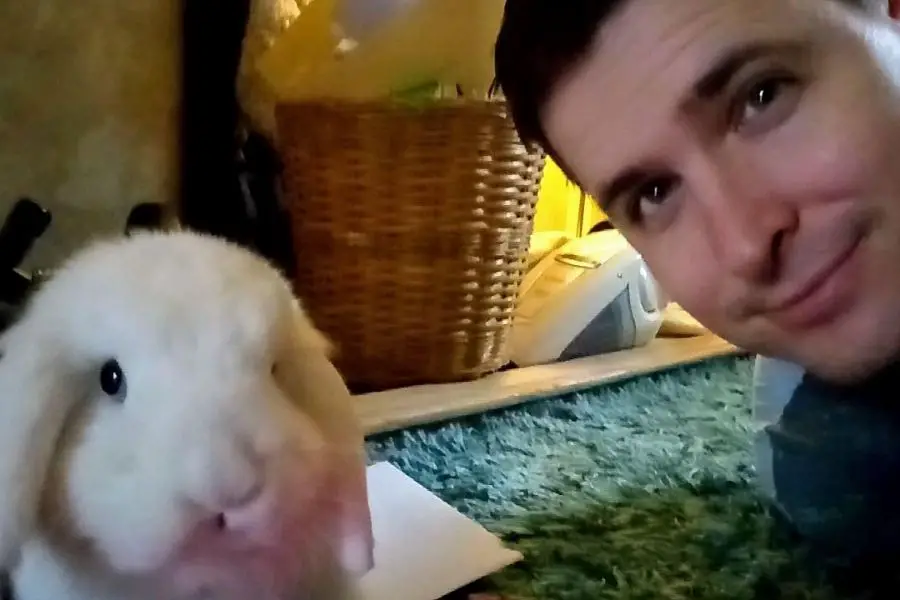
Consider introducing safe toys and engaging in games that mimic natural behaviors like digging and foraging. The more you interact with your rabbit in a positive, playful manner, the stronger your bond will become.
Spay/Neuter Your Rabbit
Unaltered rabbits can exhibit hormonal behaviors that make bonding challenging.
Spaying or neutering your rabbit not only prevents unwanted litters but can also reduce aggressive or territorial behaviors, making your rabbit easier to bond with. It’s also essential for their health, as it can prevent certain types of cancer.
Learn and Respect Your Rabbit’s Unique Personality
Every rabbit is unique, with its own likes, dislikes, and quirks. Some rabbits may be outgoing and sociable, while others may be more reserved.
Take the time to learn about your rabbit’s individual personality and respect their preferences.
This will show your rabbit that you care about their comfort and well-being, which can help strengthen your bond.
Provide Safe Hideaways
Providing hideaways in your rabbit’s environment can help them feel more secure. Hideaways can be as simple as a cardboard box or a tunnel.
These spaces provide a sense of safety for your rabbit where they can retreat if they feel scared or overwhelmed.
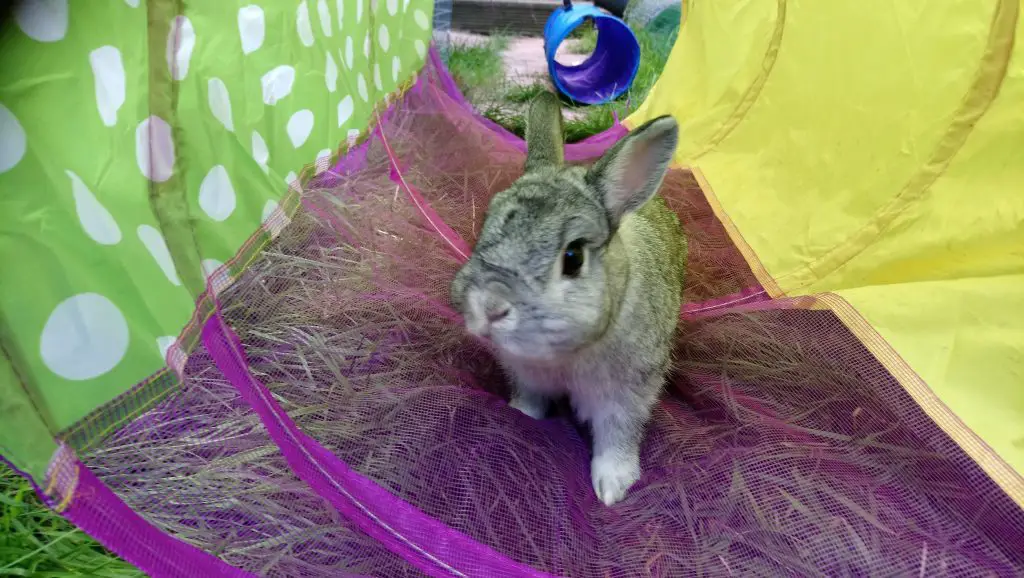
Having multiple hiding spots throughout their living area and the space they use for exercise and exploration will ensure they always have a spot to retreat to if needed.
Train Your Rabbit
Training is not just for dogs and cats! Rabbits are intelligent creatures and can learn a variety of commands and tricks.
Training through positive reinforcement, such as small treats, praise, or petting, can help build trust and mutual understanding. This can also be a great way to engage your rabbit mentally and physically.
Treat Your Rabbit (But Not Too Much!)
While it’s essential to provide a balanced diet, giving your rabbit occasional treats can be a great bonding tool.
This must be done sparingly, though, as too many treats can lead to weight gain and health issues. When you do give treats, opt for healthy options like small pieces of fruit or a few pellets.
Avoid scares, Keep Your Environment Quiet
Rabbits have very sensitive hearing and are naturally skittish due to their prey animal status, so a quiet, peaceful environment is essential for their comfort.
Try to minimize loud noises in your home and keep the volume of your television, music, or other devices low.
If your rabbit associates your presence with a calm and quiet environment, they’ll be more likely to feel relaxed and secure around you.
Treat Rabbits with Kindness
This one may seem like a given, but it’s surprising how often it can be overlooked. Rabbits are intelligent, sensitive creatures that respond well to kindness and positive reinforcement.
Remember, they are not toys or accessories, but living beings with emotions and individual personalities.
Any form of aggression, loud noises, or harsh handling can be very stressful and can permanently damage your relationship. Instead, always handle your rabbit gently, speak to them in a soft, soothing voice, and show them love and patience.
Even if they’re exhibiting behavior you’d like to change, remember that understanding and kindness will go a lot further than anger or frustration.
Avoid Manhandling Rabbits
In the wild, being lifted off the ground often means a predator has nabbed a rabbit. So, it’s no surprise domestic rabbits typically aren’t fond of being picked up either. Respecting this instinctual fear is paramount for building trust with your bunny.
Instead of forcing your rabbit into your arms, let them come to you. Spend time at their level, sitting or lying down on the floor during your bonding sessions.
Over time, your rabbit may become comfortable enough to hop onto your lap on their own terms.
If you do need to pick up your rabbit, be sure to support its entire body, especially its hind legs, to make them feel secure. Remember, though, that handling should be kept to a minimum and done only when necessary.
Quick Reference Guide
| Tip | Description |
|---|---|
| Understand Your Rabbit’s Body Language | Avoid Scares and Keep Your Environment Quiet |
| Respect Your Rabbit’s Boundaries | Rabbits are prey animals and can be scared easily. Avoid picking them up unnecessarily or cornering them. Always approach slowly and gently. |
| Spend Quality Time with Your Rabbit | Spend time sitting quietly near your rabbit’s area. Let your rabbit come to you to build trust. |
| Provide a Healthy Diet | A balanced diet is critical for your rabbit’s health and happiness. Hay should make up the bulk of their diet, supplemented with fresh veggies, some fruits, and a small number of pellets. |
| Stick to a Routine | Rabbits are creatures of habit. Regular feeding, play, and rest times help them feel secure. |
| Give Your Rabbit Space | Ensure your rabbit has a spacious living area and time out of their enclosure to explore and exercise each day. |
| Play with Your Rabbit | Interactive play helps build a bond with your rabbit. Introduce safe toys and engage in games that mimic natural behaviors like digging and foraging. |
| Spay/Neuter Your Rabbit | Unaltered rabbits can exhibit hormonal behaviors that make bonding challenging. Spaying or neutering makes rabbits healthier and can improve their behavior. |
| Learn and Respect Your Rabbit’s Unique Personality | Like humans, every rabbit is unique. Learn and respect your rabbit’s individual likes, dislikes, and quirks. |
| Provide Safe Hideaways | Providing places where your rabbit can hide will make them feel secure in their environment. |
| Train Your Rabbit | Training, when done through positive reinforcement, can help build trust and mutual understanding. |
| Treat Your Rabbit (But Not Too Much!) | Treats can be a great bonding tool but should be used sparingly due to the potential for weight gain and health issues. |
| Avoid scares and Keep Your Environment Quiet | Rabbits are sensitive to loud noises, so keeping your environment quiet can help your rabbit feel more at ease. |
| Treat Rabbits with Kindness | Reading your rabbit’s body language is the first step to effective communication. Pay attention to their posture, ear position, and vocal sounds. |
| Avoid Manhandling Rabbits | Rabbits are prey animals and naturally do not feel comfortable with their feet off the ground. Never smother a rabbit, respect its space and in time it will learn to trust and approach you on its own terms. |
Conclusion
Bonding with a rabbit requires patience, understanding, and a gentle approach. Remember that each rabbit is an individual with their own personality, likes, and dislikes.
By respecting your rabbit’s boundaries, providing a healthy diet, and spending quality time together, you will gradually build a bond of trust and mutual affection.
It’s a journey that may take time, but the reward of a deep, loving connection with your bunny is well worth the effort.
Enjoy each moment with your furry friend, and remember: the best relationships are built on respect, kindness, and love. Happy bonding!
Frequently Asked Questions
How long does it take to bond with a rabbit?
It varies greatly from rabbit to rabbit, it could be weeks or even months. Patience and understanding are key for effective bonding.
How do you tell if a bunny likes you?
If your bunny approaches you, purrs, or nudges you with its nose, these are all good signs that your bunny likes you.
What are the signs of a scared rabbit?
Scared rabbits may cower, thump their hind legs, or try to escape. They may also have wide eyes and their ears laid flat against their body.
Do rabbits like being touched?
Some rabbits enjoy petting on their terms. Remember, always approach your rabbit gently and respect their boundaries.
Do rabbits get more cuddly with age?
Rabbits may become more relaxed with age, but each rabbit’s personality is unique. Consistent gentle handling helps build trust.
